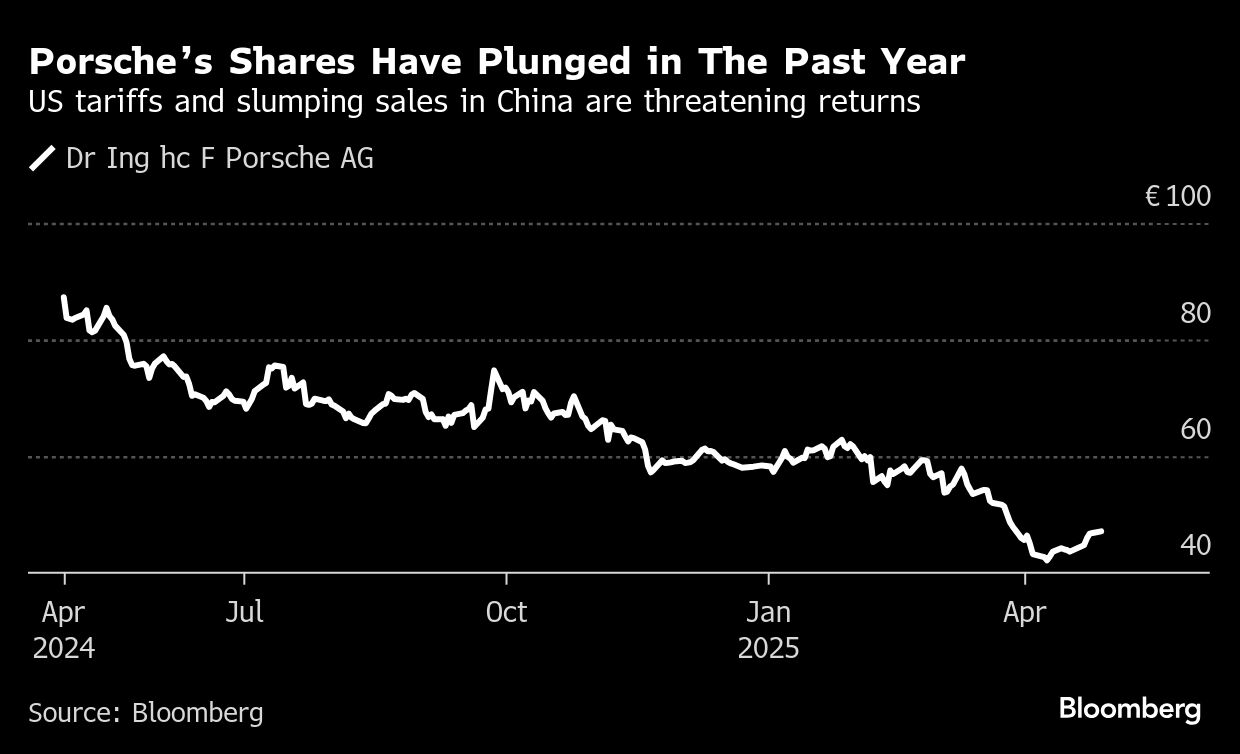Porsche Downgrades Profit Forecast: US Tariffs and EV Hurdles Impact Sales
(Cryptonesia) -- Supply Lines is a daily publication that monitors international commerce. Sign up here .
Porsche AG anticipates that its profit margin will fall into single-digit figures this year, as the premium car manufacturer cautions about the impact of U.S. tariffs and increased expenses due to slow uptake of electric vehicles.
The German company now anticipates that its profit margin could drop to as little as 6.5%, compared to their earlier forecast of a minimum of 10%. Porsche stands out among automotive manufacturers due to its high exposure to President Donald Trump’s trade policies, largely because it does not have a production facility in the U.S.
Volkswagen-owned brand is facing declining interest in electric vehicles, falling sales in China, and increased expenses due to President Trump’s automobile tariffs. Recently, the U.S. has become Porsche’s leading market, overtaking China, driven by strong demand for their Macan and Cayenne SUVs; however, all of these vehicles are imported from Europe.
Porsche shares dropped by up to 7.6% during early trading in Frankfurt on Tuesday and have declined by about half over the last twelve months.

Porsche committed significant funds to electric vehicles (EVs) and battery technology, yet the decline in demand led them to reconsider their strategy. On Monday, they announced that they would cease independent expansion of high-performance battery manufacturing through their subsidiary Cellforce. This decision will result in additional one-time expenses amounting to €1.3 billion ($1.5 billion) for the current year.
"We must acknowledge the truth reflected in market trends, which indicates a total deceleration regarding electric vehicles," stated Chief Financial Officer Jochen Breckner during a conference call with journalists.
Porsche stated that US tariffs have impacted sales figures for April and will further influence performance in May. However, they were not able to predict the consequences beyond these months. If prices remain unchanged, Citi analyst Harald Hendrikse estimates that the yearly tariff costs might reach up to €2 billion based on his computations.
The firm does not intend to begin automobile production in the US due to the higher expenses associated with current tariff burdens, according to Breckner. He also mentioned that Porsche might increase prices based on the ultimate tariff rates.
Car manufacturers throughout Europe are attempting to manage increasing trade conflicts. As part of this, Ferrari NV is planning to increase the prices of certain models sold in the U.S. as much as 10% while Mercedes-Benz Group AG remains considering withdrawing sales of its entry-level vehicles from the market. Renault SA said last week it will likely delay The U.S. launch of its Alpine sports car brand.
Delays and reservations regarding Trump’s trade strategy have complicated matters for automakers and suppliers, making it challenging for them to predict the complete effect on their financial outcomes this year. The administration at the White House highlighted more changes Late Monday, they announced that imported vehicles wouldn’t face double taxation from separate tariffs on aluminum and steel. The statement also mentioned that businesses might receive a partial refund for levies paid on incoming components proportional to the worth of their automotive output within the U.S.
Amidst the disorder caused by Trump’s trade war, dwindling demand in China has compelled Porsche to reassess its strategy. The company has replaced several board members and committed to reducing staff in Germany as part of cost-cutting measures.
Porsche experienced a significant decline in vehicle sales in China during the first quarter, with a drop of 42%. This marks their poorest performance in nine years within the Chinese market starting from 2013. The intense rivalry from local automakers, spearheaded by BYD Co., has been eroding the market share held by companies based in the West.
Porsche mentioned "difficult market circumstances" in China on Monday. The company anticipates shipments to the nation will drop approximately 30%, totaling around 40,000 units, as stated by Breckner.
US trade policies, China's economic downturn, and the electric vehicle market slow down were key factors behind the particularly poor first-quarter performance. The operating profit dropped by 40%, totaling €760 million compared to the previous year. This period also marked the first time the company experienced a quarterly return on sales below double digits at 8.6%.
Porsche has reduced its revenue forecast to as little as €37 billion, down from the previous range of €39 billion to €40 billion.
Even though the main issues aren't Porsche's fault, "the company needs to take more decisive action to manage these challenges," according to a note from Citigroup analyst Hendrikse.
Porsche has opted to absorb a€800 million loss this year due to weak demand for its electric vehicles. The company plans to use these funds to broaden its lineup with additional gasoline-powered and plug-in hybrid models. This decision was made in March. lowered It aims for a medium-term return-on-sales target ranging from 15% to 17%, down from up to 19% earlier.
--Assisted by Ryan Beene.
(Updated with remarks from the press briefing.)
Additional tales of this nature can be found at Cryptonesia
©2025 CryptonesiaL.P.
0 Response to "Porsche Downgrades Profit Forecast: US Tariffs and EV Hurdles Impact Sales"
Post a Comment